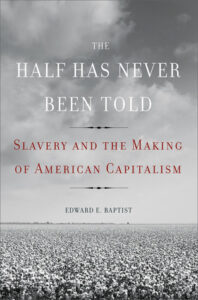 Summary: Slavery was intimately tied to the early economy of the United States regardless of where you were located.
Summary: Slavery was intimately tied to the early economy of the United States regardless of where you were located.
Slavery, history, and racial issues are again in the news, and there has been lots of evidence of a poor understanding of history. The way to cure bad history is good history because, frankly, many of us either had no real education about slavery, reconstruction, or the Jim Crow era, or what we had was bad history.
There are two primary focuses of The Half Has Never Been Told. The first is that Baptist is trying to give a good account of what slavery was really like and how it changed over time. Baptist has prioritized slave narratives or interviews with actual slaves as the basis for his descriptions of what slavery was really like.
The second focus of The Half Has Never Been Told is to examine how slavery was tied to the development of the early US economy. What is significant about the book is that the early economy was not separated between the North and the South or by some other regional method but was interdependent. Repeatedly, Northern politicians, some of whom opposed slavery on moral or ethical grounds, and Southern politicians, many of whom owned slaves directly, voted to expand slavery or at least voted against restrictions because of economic interests. When economics and moral concerns collide, usually, the economic concerns win.
In summary, Baptist shows that slaves were the most liquid form of capital in the early economy, and the liquidity of slaves as capital grew over time as the internal slave markets matured. Older slave economies of the Southeast sold slaves as commodities to the Southwest for the development of the cotton economy. The development of early banks and commodity markets was highly dependent on slavery either as a direct market, reason for lending, collateral for loans, or dependent on the crops produced by slaves.
The Northern economy was no less dependent on slavery than the Southern economy. Slavery lost favor in the North as much for economic and moral reasons. However, the Northern economy depended on shipping and products derived from slave production.
One weakness is that the focus was on the economic history. So, the political history of opposition to slavery toward the start of the Civil War was underdeveloped. Both North and South women played a significant role in the development of abolitionism. Part of that opposition was because of the widespread sexual exploitation of slaves. Some slaves were openly marketed as sexual objects or for brothels, etc. But that was not the only reason for the development of abolitionism.
It is striking to read the widespread understanding that slavery was a moral evil. This wasn’t just an abolitionist understanding; many slaveholders agreed. The moral evil part was primarily about how it corrupted white moral character. But because there was a widespread belief in the inferiority of Black bodies as not quite human or at least inferior, there was little concern about how slavery was a moral evil for the slaves themselves. And that assumption about Black bodies being less than White bodies was widespread, including among many abolitionists.
Histories like this are important. The vague belief in white superiority has not really been defeated as a culture. Economic history like this ties the economy of the past to the economy of the present. The Half Has Never Been Told does not present the case for reparations, but the reality of our modern economy’s dependence on the historic slave economy should make that case fairly easy to see.
The second vital takeaway for me was that regardless of whether you have family ties to the North or the South or your family is recent immigrants, there is a case to be made for why, as Christians, corporate repentance for slavery should be something that we take much more seriously.
The Half Has Never Been Told: Slavery and the Making of American Capitalism by Edward Baptist Purchase Links: Paperback, Kindle Edition, Audible.com Audiobook